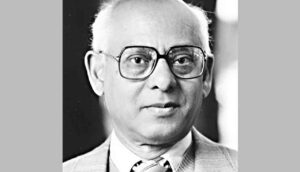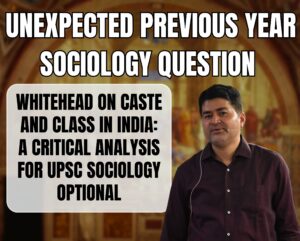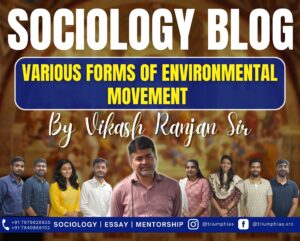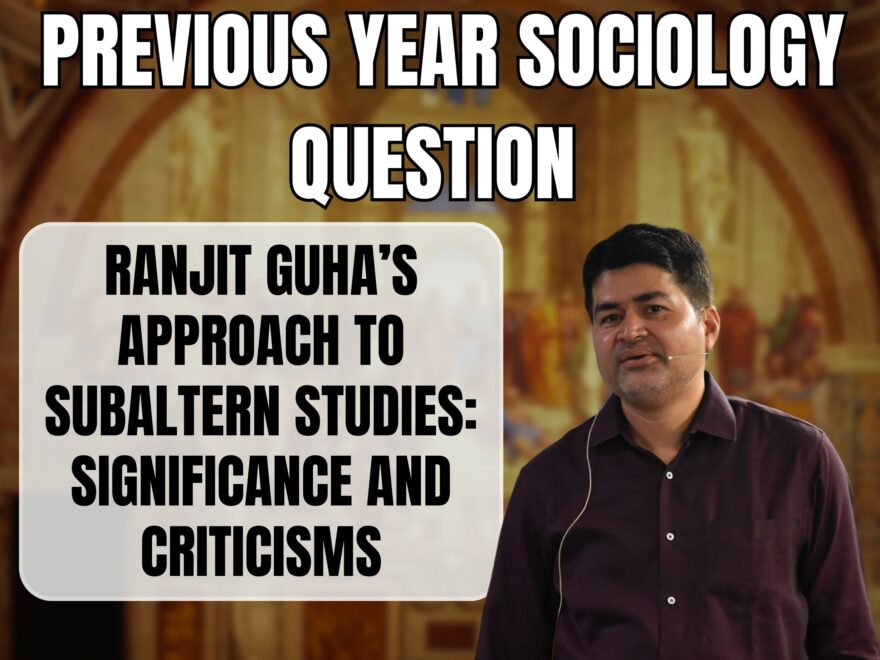Give an account of Ranjit Guha’s approach in studying ‘Subaltern Class’.
(Paper: 2, Section- A, Year 2019, Unit 11: Introducing Indian Society)

Give an account of Ranjit Guha’s approach in studying ‘subaltern class’.
(10 Marks)
| Introduction: Brief Introduction About Ranjit Guha
Main Body: Approach of Ranjit Guha, Criticism of his Subaltern Approach Conclusion: Highlighting Significance of his Approach |
Introduction
- Ranjit Guha is a prominent historian known for his pioneering approach to the study of subaltern classes and subaltern.
- Subaltern approach of sociology looks at the historical sociology from below or the history of subaltern people as opposed to the elitist perspective in history which ignores their contribution in making history.
- According to Guha, the subaltern historiography focuses on the peasants and tribal movements during colonial period in India as it has been overlooked by the dominant mainstream elitist historiography.
Guha’s approach can be summarized in the following key points:
- Defining the Subaltern: Guha introduced the term “subaltern” to describe those groups in society who are socially, politically, and economically marginalized and excluded from the centres of power and decision-making. These include peasants, tribal communities, lower-caste populations, and other oppressed groups.
- Shift from Elite to Subaltern History: Guha’s approach challenged the conventional historiographical focus on elite or ruling-class perspectives. He argued that studying the experiences, agency, and resistance of subaltern groups was essential to understanding the complexities of Indian society and its history.
- Focus on Everyday Resistance: Guha emphasized the importance of studying the everyday forms of resistance and agency displayed by subaltern groups. Rather than focusing solely on major revolts or movements, he highlighted the subtle acts of defiance, cultural expressions, and alternative narratives that subaltern communities employed to challenge oppression.
- Oral History and Local Narratives: Guha’s approach often involved the collection and analysis of oral histories and local narratives. These sources provided insights into the lived experiences and perspectives of subaltern communities, offering a more authentic view of their histories.
- Counter-Hegemonic Discourse: Guha’s work aimed to deconstruct dominant hegemonic narratives and ideologies that justified the exploitation and marginalization of subaltern groups. He argued for the importance of creating counter-narratives that challenged these dominant discourses.
- Interdisciplinary Approach: Guha’s approach was interdisciplinary, drawing from history, anthropology, sociology, and postcolonial theory. He encouraged scholars to adopt a multidisciplinary perspective to study subalternity comprehensively.
Critiques of Ranjit Guha’s Subalternism:
- Caricature of Spontaneity in Peasant Rebels: According to Sangeeta Singh, Guha’s emphasis on the spontaneity of peasant rebels can inadvertently perpetuate colonial stereotypes of irrational and emotional behavior among peasants. This view may not accurately represent the complexity of their motivations and actions.
- Lack of Concern for Outcomes: Javeed Alam criticizes Guha for focusing on of peasant resistance without thoroughly examining the outcomes of such resistance. Guha’s approach does not assess whether these actions lead to positive or negative changes or contribute to the broader social currents.
- Undefined Definition of Subalterns: Ranjit Das Gupta points out that Guha’s concept of subalterns lacks a precise and comprehensive definition. Subaltern studies often concentrate on moments of conflict and protest, overlooking the potential for negotiation and collaboration as outcomes of dialectical processes.
- Role of the State: Guha’s approach may not sufficiently address the role of the state and its institutions in shaping the experiences of subaltern groups, as suggested by critics.
- Rewriting History without Substantial Evidence: Christopher Bayly suggests that subaltern historians, including Guha, may lack substantial evidence to support their claims of rewriting history. They are accused of merely reinterpreting official records without presenting new empirical data.
Conclusion
Ranjit Guha’s subaltern approach represents a departure from traditional historical sociology, aiming to incorporate the narratives of the masses into the study of the Indian national movement. Guha attempts to escape Marxist and elitist determinism, a different form of determinism may be discerned in his works, which aligns with postmodernist and postcolonialist traditions.
Related Blogs …
 |
 |

To master these intricacies and fare well in the Sociology Optional Syllabus, aspiring sociologists might benefit from guidance by the Best Sociology Optional Teacher and participation in the Best Sociology Optional Coaching. These avenues provide comprehensive assistance, ensuring a solid understanding of sociology’s diverse methodologies and techniques.
META TAGS:
Ranjit Guha, Subaltern Studies, Indian History, Marginalized Groups, Peasant Movements, Tribal Communities, Oral History, Postcolonial Theory, Hegemony, Interdisciplinary, Criticism, Elite History, Everyday Resistance, UPSC Sociology, Ranjit Guha, Subaltern Studies, Indian History, Marginalized Groups, Peasant Movements
Why Vikash Ranjan’s Classes for Sociology?
Proper guidance and assistance are required to learn the skill of interlinking current happenings with the conventional topics. VIKASH RANJAN SIR at TRIUMPH IAS guides students according to the Recent Trends of UPSC, making him the Best Sociology Teacher for Sociology Optional UPSC.
At Triumph IAS, the Best Sociology Optional Coaching platform, we not only provide the best study material and applied classes for Sociology for IAS but also conduct regular assignments and class tests to assess candidates’ writing skills and understanding of the subject.
Choose The Best Sociology Optional Teacher for IAS Preparation?
At the beginning of the journey for Civil Services Examination preparation, many students face a pivotal decision – selecting their optional subject. Questions such as “which optional subject is the best?” and “which optional subject is the most scoring?” frequently come to mind. Choosing the right optional subject, like choosing the best sociology optional teacher, is a subjective yet vital step that requires a thoughtful decision based on facts. A misstep in this crucial decision can indeed prove disastrous.
Ever since the exam pattern was revamped in 2013, the UPSC has eliminated the need for a second optional subject. Now, candidates have to choose only one optional subject for the UPSC Mains, which has two papers of 250 marks each. One of the compelling choices for many has been the sociology optional. However, it’s strongly advised to decide on your optional subject for mains well ahead of time to get sufficient time to complete the syllabus. After all, most students score similarly in General Studies Papers; it’s the score in the optional subject & essay that contributes significantly to the final selection.
“A sound strategy does not rely solely on the popular
Opinion of toppers or famous YouTubers cum teachers.”
It requires understanding one’s ability, interest, and the relevance of the subject, not just for the exam but also for life in general. Hence, when selecting the best sociology teacher, one must consider the usefulness of sociology optional coaching in General Studies, Essay, and Personality Test.
The choice of the optional subject should be based on objective criteria, such as the nature, scope, and size of the syllabus, uniformity and stability in the question pattern, relevance of the syllabic content in daily life in society, and the availability of study material and guidance. For example, choosing the best sociology optional coaching can ensure access to top-quality study materials and experienced teachers. Always remember, the approach of the UPSC optional subject differs from your academic studies of subjects. Therefore, before settling for sociology optional, you need to analyze the syllabus, previous years’ pattern, subject requirements (be it ideal, visionary, numerical, conceptual theoretical), and your comfort level with the subject.
This decision marks a critical point in your UPSC – CSE journey, potentially determining your success in a career in IAS/Civil Services. Therefore, it’s crucial to choose wisely, whether it’s the optional subject or the best sociology optional teacher. Always base your decision on accurate facts, and never let your emotional biases guide your choices. After all, the search for the best sociology optional coaching is about finding the perfect fit for your unique academic needs and aspirations.
Follow us :
🔎 https://www.instagram.com/triumphias
🔎https://www.youtube.com/c/TriumphIAS
https://t.me/VikashRanjanSociology
Find More Blogs
|
Scope of the subject and comparison with other social sciences |
|||
|
|
|
|
Modernity and social changes in Europe |

